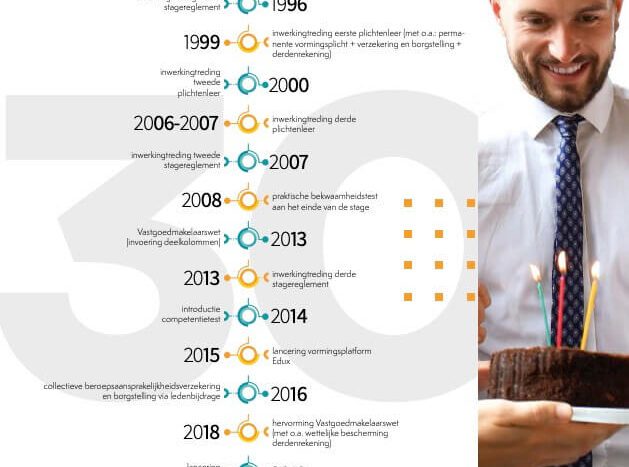The importance of better regulation in the Spanish property market
At Investinspain.be, we are passionate about regulation in the Spanish property market. In this article, we dive back 30 years to examine the Founding of the IPI. In short, a retrospective. Moreover, we explain why the IPI is also advantageous for people looking to buy Spanish property from an IPI-certified estate agent.
What is IPI (the Professional Institute of Real Estate Agents)
The Professional Institute of Real Estate Agents (IPI) protects buyers by ensuring that the agent has third-party liability insurance, is constantly trained and must adhere to their code of ethics. Regulations in the Spanish property market are milder, here a similar seal is not mandatory.
Thirty Years of Regulation: The Professionalisation of the Real Estate Sector in Belgium
The Founding of the IPI: A Retrospective History
An important event took place on 6 September 1993 that would change the real estate sector in Belgium forever. The royal decree protecting the professional title of real estate agent and the practice of the profession was passed exactly 30 years ago. That decision also laid the foundations for the establishment of the Professional Institute of Real Estate Agents (IPI).
The Need for Regulation (as opposed to regulation Spanish property market)
Before 1954, there was no regulated real estate organisation in Belgium, which meant that anyone could call himself a real estate agent (the regulations in the Spanish real estate market are still like that). This lack of protection led to questionable practices that damaged both consumers and the profession’s image. In 1991, two federations, CIB* and UIB**, petitioned for regulation under the 1976 Framework Act, which allowed service-oriented intellectual professions to organise themselves as Professional Institutes. These efforts eventually led to the creation of the IPI. Something that does not exist when it comes to regulations in the Spanish property market.
*Confederatie van Immobiliënberoepen Vlaanderen= Confederation of Real Estate Professions Flanders
**Unie der Immobiliënberoepen van België= Union of the Real Estate Professions of Belgium
The Establishment of the IPI
Following the RD of 6 September 1993, real estate agents were required to register with the municipality and provide various proofs of experience. On the basis of these registration lists, those concerned could be informed about their registration with the BIV and their right to vote in the first BIV elections in 1994. The official establishment of the IPI took place on 1 March 1995.

Evolution of the number of Members
After registering with the municipalities, the IPI initially had 12,411 members at the end of 1995. Over the years, however, this number has declined as some members ceased their activities or passed away. As of 31 December 2022, only 12% of all members were still registered on municipal lists.
The Real Estate Brokerage Act: A New Milestone in Professionalisation
Despite the protection of the professional title in the Royal Decree of 6 September 1993, there was no specific law for real estate agents. It was only on 11 February 2013 that the Real Estate Agents Act was passed, which further professionalised the profession. This law also introduced two sub-columns, that of mediator and trustee.
In 2018, the reformed Real Estate Brokerage Act came into force, offering more transparency to consumers. For instance, final disciplinary decisions were automatically communicated to the complainant, and complainants have since been able to have a dismissal reviewed by a judicial-assessor general. The IPI was also given the power to ask the court through an emergency procedure to take protective measures for serious offences to prevent further victims.
Doctrine of Duty: Built from the Ground Up
When the IPI was set up, everything had to be built from scratch. There was no doctrine of duties, no compulsory training, and no practical aptitude test. Starting from a blank sheet, several working groups were formed, including deontology, training, pricing, documentation informatics, and image of the profession. To date, there are still active working groups at the IPI. Again, this is not the case with the regulation of the Spanish property market.
- Grand Park Costa del Sol in Mijas: The largest park on the Costa del Sol
- High-speed train launched between Malaga, Alicante and Murcia
- New Malaga-marbella rail line: Long-term Plans For Faster Connection
- Spain in Europe’s top 4 countries for real estate investment 2023
- The cost of living on the Costa del Sol compared to Belgium and the Netherlands in 2024
Regulation Spanish real estate market
Many professionals in the property sector in southern Spain are concerned that the vast majority of estate agents on the Costa del Sol are not members of a professional association or affiliated to the Official College of Estate Agents. In Spain, anyone can become a real estate agent because regulations in the Spanish real estate market are not strict. This actually makes it even more important for property buyers to be able to recognise a reliable estate agent. Thanks to the IPI seal of approval, it is easy to distinguish these reliable estate agents from the rest in Belgium.
Conclusion Belgium and regulation Spanish real estate market
The past 30 years have led to an unprecedented wave of professionalisation in the Belgian real estate sector. From the creation of the IPI to the introduction of the Real Estate Brokerage Act and the development of a duties doctrine, Belgium has made great strides to regulate and improve real estate brokerage. These regulatory measures have contributed to a positive impact on the image of the profession and the protection of consumer rights. For buyers looking for property in Spain, the IPI is also an added value. Indeed, regulations in the Spanish property market make it easy for dodgy estate agents.
More interesting articles from our real estate blog:

Gunther de Vleeschouwer, co-founder of Investinspain.be, explains: “Not all brokers are registered as it is not a legal requirement, but we would strongly advise buyers to be careful and make sure they are represented by a licensed agent.”










